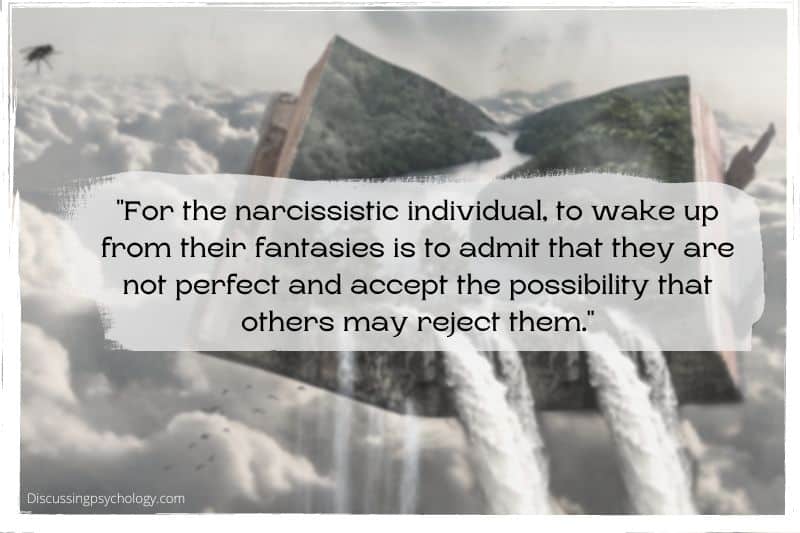Individuals diagnosed with Narcissistic Personality Disorder (NPD) commonly display an exaggerated sense of superiority, which can be so untethered from reality that it crosses the line into fantasy.
Therefore, it seems plausible there could be a strong link between narcissism and maladaptive daydreaming (MD). Here’s what the studies show.
Narcissism and Maladaptive Daydreaming: What does the science say?
Researchers have established a clear correlation between NPD and the presence of maladaptive daydreaming. Those with narcissistic tendencies frequently indulge in fantasies revolving around power, controlling others, and vengeance as a means to uphold their own grandiosity.
From the very onset of research in maladaptive daydreaming, the possibility that narcissism could be a contributing factor was considered.
One of the first examinations of patients with maladaptive daydreaming was conducted by Israeli psychologist Eli Somer in 2002.
Of the six patients Somer treated, two were diagnosed with NPD. Both of these patients had been lonely as children and continued to experience a feeling of isolation as adults.
For these narcissistic individuals, spending hours each day in daydreams was all about regaining a sense of power and control.
One patient described it like this:
“When I am frustrated or sad I won’t talk to anyone about it. Instead I cultivate forceful, domineering sexual plots in which I am in total control… This helps create good lively feelings.”
– Anonymous NPD Patient (Somer, 2002)
Recent Studies on NPD & MD
The link between narcissism and maladaptive daydreaming was examined again in a larger study from 2021.
In this study, 539 adults were assessed for levels of maladaptive daydreaming and various personality traits.
They found a clear connection between levels of narcissism and maladaptive daydreams relating to power, dominance and wish fulfillment.
This was in contrast to other forms of maladaptive daydreaming, in which the content of daydreaming had more benign themes such as being in loving, idealized relationships or escaping from adverse circumstances.
Maladaptive Daydreaming vs Narcissistic Maladaptive Daydreaming
| Regular MD Fantasy | Narcissistic MD Fantasy |
| Intimate, fulfilling romantic love. | Power and perfectionism. |
| Prosocial, loving relationships. | Goal-oriented wish fulfillment. |
| Daydreams to escape adverse circumstances. | Revenge and dominance over others. |
Specifically, other reported themes in the daydreams of narcissistic people included:
- Getting revenge on people who had wronged them
- Sexual conquest or dominance over romantic partners
- Becoming an idealized or perfected version of themselves
- Holding people captive
So while there is currently no research examining the possible link between Narcissistic Personality Disorder and maladaptive daydreaming, there is a clear connection between narcissism as a personality trait and the tendency to engage in fantasies of power, often to a level that is considered maladaptive.
Why do Narcissists Fantasize?
Unmet needs
Currently, it is generally believed that maladaptive daydreaming is caused by an individual having unmet needs. A person feels that their real life is in some way lacking and so turns to daydreams and fantasies to have their desires met.
Individuals with unhappy family lives or who feel socially isolated, for example, may construct fantasy narratives in which they are part of loving families or receive widespread recognition and acceptance from others.
For narcissists, it’s all about entitlement.
People with high levels of narcissism believe that they deserve:
- Power.
- Authority.
- Idealized sex.
- Constant praise.
- Attention and adoration from others.
But what happens when this doesn’t happen, when they don’t get the level of recognition they feel they deserve? They turn to fantasies.
Daydreaming, whether it reaches the extreme levels of maladaptive daydreaming or not is used by narcissists as a way to cope with the distress and frustration of the world failing to give them their dues.
But it also serves a deeper function, one that maintains and reinforces a narcissist’s sense of self-importance.
Turning fantasy into reality
Narcissists often engage in elaborate daydreaming as a way to reconcile their sense of importance and superiority with the actual position they hold in the world.
This can be directed towards both the future and the past, imagining future glory for themselves while distorting or adjusting past events in their minds to show themselves in a more favorable light.
Daydreaming therefore serves to ‘control the narrative’ the narcissist holds about themselves.

This might not be much of an issue if their delusions were kept solely in their own heads, but some researchers believe that daydreaming serves to perpetuate their sense of entitlement – and their willingness to exploit other people for their own gains.
For narcissists, daydreams and fantasies are all about adjusting reality to fit with their view of themselves.
It’s no wonder, then, that the line between fantasy and reality can sometimes blur.
The fear of waking up
In most people who experience maladaptive daydreaming, the distress caused by the condition is mostly limited to the daydreamer themselves.
But in people with high degrees of narcissism, their daydreams serve to inflate their egos and perpetuate a mentality where their own needs are placed above those of others.
Ultimately, narcissism is about fear.
The feeling of being above the rest of the world and the daydreams it produces are a defense against insecurity and the fear of being abandoned or rejected by those they love.
For the narcissistic individual, to wake up from their fantasies is to admit that they are not perfect and accept the possibility that others may reject them.
When given this choice, it is perhaps unsurprising that most narcissists choose to continue dreaming.
- Brenner, R., Somer, E., & Abu-Rayya, H. (2022). Personality traits and maladaptive daydreaming: Fantasy functions and themes in a multi-country sample. Personality and Individual Differences, 184, 111194. https://doi.org/10.1016/j.paid.2021.111194
- Glover, N., Miller, J., Lynam, D., Crego, C., & Widiger, T. (2012). The Five-Factor Narcissism Inventory: A Five-Factor measure of narcissistic personality traits. Journal of Personality Assessment, 94(5), 500--512. https://doi.org/10.1080/00223891.2012.670680
- Nazario, B (2020, June 18). Narcissistic Personality Disorder. WebMD. https://www.webmd.com/mental-health/narcissistic-personality-disorder
- Somer, E. (2002). Maladaptive daydreaming: A qualitative inquiry. Journal of Contemporary Psychotherapy 32, 197–212. https://doi.org/10.1023/A:1020597026919
- Somer, E., Somer, L., & Jopp, D. (2016). Parallel lives: A phenomenological study of the lived experience of maladaptive daydreaming. Journal of Trauma and Dissociation, 17(5), 561–576. https://doi.org/10.1080/15299732.2016.1160463

